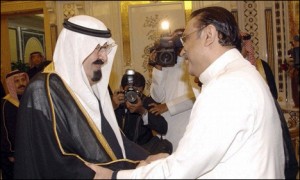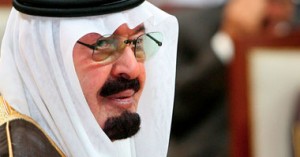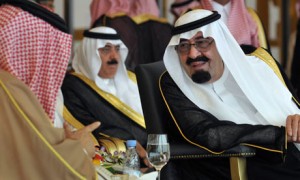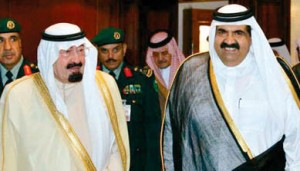
In normal circumstances, a visit by a Pakistani minister to Riyadh would make no news at all. But these are interesting, although not abnormal, times in Pakistan-Saudi relationship.
There is a consensus among political observers that after the inception of the PPP-led government in 2008, Islamabad’s ties with Riyadh had lost the warmth that had defined their partnership for the past six decades.
But the chill has apparently given way to a thaw, the observers think, and Islamabad now seems to be back on the regional radar — for more than one reasons.
The visit is taking place in the backdrop of the so called ‘Arab spring’ which has almost stalled and appears to be going nowhere. Old regional alignments are being revived and new alignments have been emerging on the wider Middle East chessboard as a new cold war between regional heavyweights gets stickier.
The ongoing popular uprising in a number of countries have all lent a new meaning to the Arab-Iran gulf. And Pakistan’s role in the scenario has come under a renewed focus.
Events over the past few years have only helped reinforce and entrench misgivings within the Arab world about the growing Iranian influence. The departure of Saddam Hussain from Baghdad and the fostering of Maliki government in Iraq, has led many to look at the development from a different perspective- the growing Shia influence in the Arab world.
King Abdullah of Jordan once referred to it as “the expanding Shia crescent” in the region. Arab governments feel apprehensive on that account. And recent events seem to have only reinforced their fears.
In Lebanon the influence of the pro-Iran Hezbollah is ascending — at the expense of the Saudi-backed Hariri. This was regarded by many here as a strategic loss.
Riyadh has also been complaining, for long, of the growing Iranian influence in Hamas-ruled Gaza. And to counter Tehran’s growing clout, Riyadh had little option than supporting the pro-West Abbas set-up in the West Bank. Then the upheaval in Egypt turned out to be the last straw on the back of the proverbial camel. King Abdullah of Saudi Arabia supported Hosni Mubarak till the end.
The US failure to support Mubarak, not only soured the political relations between Riyadh and Washington, but also forced the Kingdom to play its cards rather aggressively. There was no room for further complacency — many felt here.
When the uprising began in Bahrain, everyone here in Riyadh realised the stakes were too high. The option of watching things take its own course was definitely not on the table. Riyadh acted and acted swiftly.
WAR OF WORDS
An explosive war of words erupted between Riyadh and Tehran. Events in Bahrain exacerbated tensions between Saudi Arabia, its Arab allies and Iran, dragging relations between them to its ebb in at least a decade and setting the stage for confrontations elsewhere in the region.
The Gulf Cooperation Council, comprising six Arab states around the Gulf, was also dragged into action. The GCC explicitly warned Iran of dire consequences, if it continued endeavouring to make inroads into the Arab world.
Back-channel diplomacy was also used to send the message in rather clear terms to Tehran. Gulf governments were no more ready to give in and vowed doing everything at their disposal to protect their ‘legitimate interests’.
Hands off the Arab world — was the clear message to Iran. And in the meantime, the Arab world also went into full gear to galvanise support and muscle to block Tehran’s inroads, into what is being termed here the ‘Arab territory’ – through the Shia soft belly of the Arab states.
And it is here that Pakistan and Turkey got into the loop too. For after all these are the two strongest countries — as far as muscle is concerned — within the Sunni world.
A stream of events took place in a short span of time. Saudi National Security Council chief Prince Bandar bin Abdul Aziz came over to Islamabad, immediately after the meeting in Kuwait of President Zardari and Prince Naif bin Abdulaziz, the second deputy premier and the long-time interior minister.
And Prince Bandar’s visit was preceded by a visit of the Saudi chief of staff to Pakistan. In the meantime, the Bahraini foreign minister also dashed to Pakistan, despite the ongoing strife in his country.
Something was indeed brewing. Islamabad was again on the radar in Riyadh. Interestingly, the visit of Hina Rabbani Khar to Riyadh was announced after Prince Bandar sent a letter to Prime Minister Gilani — following up on his meetings in Islamabad late last month. In the letter, Prince Bandar reiterated Saudis’ desire to further strengthen relations with Pakistan in all areas of mutual interest.
In the aftermath of Prince Bandar’s regional visit, Riyadh has already signed a security agreement with Malaysia, vowing to enhance the level of security cooperation between the two countries. And after his Beijing trip, Saudi Arabia and China too announced signing an agreement on nuclear cooperation for peaceful purpose.
And Prince Bandar is no ordinary diplomat. He is often regarded as a trouble-shooter for Riyadh. John Hannah, writing in the Foreign Policy magazine, says: ‘Saudi Arabia’s legendary former ambassador to Washington, Prince Bandar bin Sultan, is once again a major presence on the world stage.’
And his previous visit to Pakistan did not escape world attention and generated considerable interest. In the same story Hannah says: “More interestingly – and undoubtedly more worrisome – at the end of March, in the wake of the Saudi intervention in Bahrain, Bandar was dispatched to Pakistan, China and India to rally support for the kingdom’s hard line approach to the region’s unrest.
“Bandar’s formidable skills in the service of a Saudi Arabia that feels itself increasingly cornered and unable to rely on US protection is a formula for trouble — made even worse when the likes of Pakistan and China are thrown into the mix.
“No one should forget that, in the late 1980s, it was Bandar who secretly brokered the delivery of Chinese medium-range missiles to the kingdom, totally surprising Washington and nearly triggering a major crisis with Israel. The danger today, of course, is that the Saudis feel sufficiently threatened and alone to engage in similar acts of self-help.
“Would they seek to modernise their ballistic missile force? Even worse, would the kingdom go shopping for nuclear weapons or, at a minimum, invite Pakistan to deploy part of its nuclear arsenal in the country?”
As the Middle East convulses and Iran relentlessly inches closer to achieving a nuclear weapons capability, has that time finally arrived? Even short of these extreme scenarios, other troubling possibilities exist. During his trip to Pakistan, Bandar reportedly discussed contingencies under which thousands of additional Pakistani security forces might be dispatched to Bahrain and Saudi Arabia to crush the uprising.
So it appears Pakistan is getting sucked into a regional cold war — and Washington may not mind it this time too. When Hina Rabbani Khar lands in Riyadh today, she can expect the red carpet to roll — once again. The talk of chill seems a distant story.




























